Edie Melson's Blog, page 40
September 9, 2024
Tips to Help Develop a Healthy Perspective on Winning Writing Awards
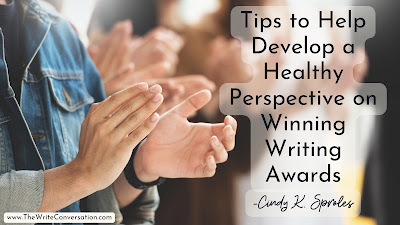
by Cindy K. Sproles @CindyDevoted
Let me begin this post by saying winning a writing award is always honey on the toast—but sweets can make us crave more. All right, I'm no famous philosopher, but hang with me. If you enter a contest (and you should) and you win—congratulations. That's wonderful. Share your joy. Accept your pat on the back. We don't always get those in the writing world.
Writing is a long process, and the rewards come slowly, so to have a win is stupendous. Just keep the wins in perspective.
Writers need to enter contests whether they are newbies or well-published. The why is the same across the board. First, it's a practice in presenting your best. Entering a contest forces you to push hard to polish and shine your work-in-progress. Then, you're committed to opening your work and yourself to the world to be read. Next, it's a training session in meeting deadlines and following instructions—something all writers need to master. Contests are good.
For the well-published author, contests not only keep us practiced in presenting our work, but they also keep us humble. Everyone would agree that winning is wonderful, but we all need to learn to lose and gain lessons from that loss. Industry awards overflow with entries. To win out of hundreds is an honor. It's essential to put your work through the fire in order to refine it.
But what is the actual value of winning an award? Well, they look nice on the wall until they begin to clutter it (if only I could win that many awards!). My son walked into my office one day when he was visiting, and he gleaned through my small stash of plaques, only to remark, "Wow, Mom, I didn't know you won that many awards."
"First off," I said, "That's not a lot of awards. And secondly, I don't usually wave a flag. It's a sign of personal accomplishment. No one else really cares."
"Still, it makes me proud of you." He reached across and hugged me. "You've worked hard. So, let me ask you a question. When you kick the bucket, what should I do with those?" Though he was teasing me, the reality of awards came to light. And this is what spurs this post.
Here's the Reality of Winning a Writing Award: Awards bring little to no additional sales to a published author. Sad but true. When consumers walk into a bookstore, they have no idea what the prestige of winning a Christy means. They pick books because they love them, not because they have won awards.Consumers have no idea what individual book awards mean. Unless it says Pulitzer, most folks could care less because they don't know what it is.Conference awards and industry awards don't guarantee a writer a contract. Again, sad, but true. Sales help bring contracts—the more sales and author garners, the more opportunity for additional contracts.And finally, what will happen to them when I die? My son, though teasing me, was right. What exactly do I plan for him to do with my writing awards? They aren't million-seller novels that rate beautifully framed book covers from the industry with huge notoriety, so they'll probably never adorn the walls of his home.Now, let's look at what an award is. Awards are signs of personal accomplishment. As writers, we've set goals, worked toward them, and hopefully accomplished them. When we win an award, it's our pat on the back for remaining persistent, determined, and persevering.
Awards challenge us personally to strive harder. I watched the 2024 Olympic track and field events and Sydney McLaughin-Levrone after her record-smashing 400 m hurdle win. In an interview with Nick McCarvel on www.olympics.com, McLaughin-Levrone said, "You know, there's always ways to improve. And I love trying to figure out what those are and push myself to break those barriers and boundaries."
Awards, wins, and successes challenge us to work harder, refine our craft, and make our work and ourselves the best possible. This is why you enter, even if you don't win. Contests will help spur you to do better, and when the win comes, there's that personal accomplishment.
Finally, contests and awards, whether you win or lose, help us learn and live humility. There is as much humility in the loss as is in the win. Everyone kept telling me that my first novel would win a Christy Award. I tried not to think about it. After all, I was a debut novelist, and just having the book nominated was a win. As announcements for the award finalists were made public, there was no sign of my novel. Despite all the folks around me assuring me I would win, I didn't even final. I wasn't disappointed. I was embarrassed that I'd allowed myself to feed into something no one could know. Though I'd not spent time telling others the book was entered into the Christy Awards, I learned a valuable lesson in humility. Stay grounded in the task. Work hard and then harder. Trust your success to God.
When the book failed to win another hefty award, I felt a tap in my heart. "You promised me." And it hit me. My prayer over my book was that God would use it. That He would accept the glory, not me." Every loss was a reminder that I'd promised the glory to God. Now, before you throw me to the wolves, pay attention. That first novel came out in 2016 and is still selling well. When I walk into our local Books-a-Million store, and they ask who I am, their response is, "Mercy's Rain. We sell that book almost daily." God blesses the book, and the rewards come in other ways. It, along with others, has won their share of accolades, and I am blessed to see awards hang on my wall. Those awards remind me of the hard work that went into each word, but more so, they remind me to be humble. Share and help how I can with others.
Awards are great, but the biggest thing you can remember when you hang one on your wall is that you are blessed to be a writer. Blessed to share your craft and pleased at the personal accomplishment. Pat yourself on the back as you stand in your office, and then walk out thanking the Father who gifted you with a gift and a win.
TWEETABLETips to Help Develop a Healthy Perspective on Winning Writing Awards from @CindyDevoted on @EdieMelson (Click to Tweet)
 Cindy K. Sproles is an author, speaker, and conference teacher. Having served for a number of years as a managing editor for Lighthouse Publishing of the Carolinas and Ironstream Media, Cindy now works as a mentor, coach, and freelance editor. She is the co-founder of Writing Right Author Mentoring Services with Lori Marett and she is the director of the Asheville Christian Writers Conference. Cindy is also the co-founder of Christian Devotions Ministries and WWW.CHRISTIANDEVOTIONS.US, as well as WWW.INSPIREAFIRE.COM. Her devotions are in newspapers and magazines nationwide, and her novels have become award-winning best-selling works. She is a popular speaker at conferences and a natural encourager. Cindy is a mountain girl, born and raised in the Appalachian mountains, where she and her husband still reside. She has raised four sons and now resorts to raising chickens where the pecking order is easier to manage. You can visit Cindy at WWW.CINDYSPROLES.COM or www.wramsforwriters.com.
Cindy K. Sproles is an author, speaker, and conference teacher. Having served for a number of years as a managing editor for Lighthouse Publishing of the Carolinas and Ironstream Media, Cindy now works as a mentor, coach, and freelance editor. She is the co-founder of Writing Right Author Mentoring Services with Lori Marett and she is the director of the Asheville Christian Writers Conference. Cindy is also the co-founder of Christian Devotions Ministries and WWW.CHRISTIANDEVOTIONS.US, as well as WWW.INSPIREAFIRE.COM. Her devotions are in newspapers and magazines nationwide, and her novels have become award-winning best-selling works. She is a popular speaker at conferences and a natural encourager. Cindy is a mountain girl, born and raised in the Appalachian mountains, where she and her husband still reside. She has raised four sons and now resorts to raising chickens where the pecking order is easier to manage. You can visit Cindy at WWW.CINDYSPROLES.COM or www.wramsforwriters.com.
Published on September 09, 2024 22:00
September 8, 2024
Dealing With Writing Rejection is Painful but Not Impossible to Overcome

by Larry J. Leech II @LarryJLeechII
The word ‘no’ may be the second most-dreaded word in the English language, behind only ‘cancer.’
I don’t know about you, but a number of emotions rise to the surface when I’m told ‘no,’ ‘not now,’ ‘maybe later,’ or ‘hold on.’ All those sound and feel like rejection. I get that rejection is part of life, but sometimes, well, most of the time, being rejected just flat out stinks.
When we don’t get our way, the emotional reactions vary, depending on age. Toddlers and young children might throw a temper tantrum. Maybe even throw something. Older children, even adults, might slam a fist on a table. Or pout. Or stomp out of a room.
How quickly one overcomes rejections depends on each person’s personality and the type of rejection. A person rejected after being with another person for years certainly takes longer to overcome than being told “No, I don’t want to go out with you again” after a few dates.
Recently I was told ‘no’ in regard to something I really wanted. Something I wanted more than I realized when I first brought up the idea. When the negative decision was announced, I did my best to mask my emotions. But after the call ended, I cried for an hour. Later, I held a pity party—until I realized that the ‘no’ could be ‘not right now.’ Okay, that helped. So, now the ‘no’ still stings, but doesn’t hurt like it did.
For me, I have learned that when I am rejected, I absolutely must recognize and ‘feel’ my emotions. Stuffing them and pretending I’m okay causes more problems later—resentment, hatred, anger, fear, anxiety, stress.
Then I need some self-care. That usually entails a nap or cranking some of my music.
And when I turn to God for comfort from the rejection, I begin to trust that the ‘no’ is part of his plan for my career, my relationships, my life. Then I can fully move on from the hurt and disappointment.
What are some ways that you deal with rejection? I’d love to hear what helps return you to a positive outlook.
TWEETABLEDealing With Writing Rejection is Painful but Not Impossible to Overcome - @LarryJLeechII on @EdieMelson (Click to Tweet)
 Editor-in-Chief at Bold Vision Books and writing coach of award-winning authors, Larry J. Leech II has spent more than forty years writing and editing. He started his career as a sportswriter in southwestern Pennsylvania where he covered prep, college, and pro sports, including the Pittsburgh Pirates and Steelers.
Editor-in-Chief at Bold Vision Books and writing coach of award-winning authors, Larry J. Leech II has spent more than forty years writing and editing. He started his career as a sportswriter in southwestern Pennsylvania where he covered prep, college, and pro sports, including the Pittsburgh Pirates and Steelers. In 2004, after 2,300 published articles, Larry moved into the book publishing industry. Since that time, he has ghostwritten 30 books, edited more than 400 manuscripts, and coached hundreds of authors through the writing and publication process. You can find him online on Twitter, Facebook, and Instagram.
Published on September 08, 2024 22:00
September 7, 2024
How to Beat Writing Exhaustion
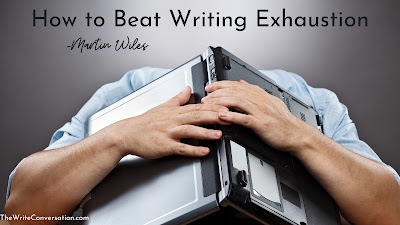
by Martin Wiles @LinesFromGod
Exhausting. From a teacher’s perspective, I can think of no better word to describe the first week of school.
This year, we began with two days of in-service. But not two days to serve in our rooms. The headmaster only promised less than two hours of that each day—thankfully, we got a little more. Meetings filled both days. New Information. New rules. Other changes. As usual, my brain lit up, “Info Overload,” by the day’s end.
Then, the kids showed up. The first day was tolerable, other than having to reign them back into a schedule they hadn’t experienced for almost three months. Besides that, we teachers spent every class reminding them of the old rules and informing them about the new changes. By the end of the day, my voice croaked.
By the second day, I was done with the rules. Time to get busy teaching. Other than the sixth graders, the other two grades had already ridden a rodeo with me and knew my expectations. I was a hard sell, a tough knot, and they knew the drill.
What I wasn’t ready for was my eighth-grade computer class. Our young folks might be tech-savvy on their devices (smartphones), but most know little, if anything, about the practical use of laptops and desktops--how to use Word, Excel, PowerPoint, or their Google counterparts. Getting them signed in to their school emails and then to typing.com took one-and-a-half class periods.
When Saturday morning rolled around, I told my wife, “I don’t want to do anything today except sit in my recliner and read, write, and edit.” For me, that’s the essence of relaxation.
Amid the busy school week came attending the funeral of a church member and receiving a new writing assignment. Additionally, I had my usual writing and editing duties, along with preparing a sermon and Sunday school lesson for Sunday. Somewhere in that mix, I had to make time for my beautiful wife, our two fur babies, our aging parents, my children, and our grandchildren. Exhausting.
I thought about the psalmist’s words: “It is useless for you to work so hard from early morning until late at night, anxiously working for food to eat; for God gives rest to his loved ones” (Psalm 127:2 NLT).
Life can be exhausting. So can writing, which may be why many give it up or don’t pursue it as diligently as they should. If God has called us to it (part- or full-time), he will give us the strength to carry out the calling. He’ll not overload us, although we can easily overload ourselves. Jesus knew the importance of downtime, and we must schedule it, too, or we’ll find ourselves hating what we should love: writing.
Stress erupts from Struggle, Tension, Restlessness, and unrealistic Expectations. But with Stretching (physical and spiritual exercise), we can find Satisfaction. Jesus calls it the abundant life, and Paul terms it peace beyond our understanding.
Don’t give up on what God has called you to do. The writing life doesn’t have to be exhausting, and when we look to God for guidance, it won’t be.
TWEETABLEHow to Beat #Writing Exhaustion from Martin Wiles (@LinesFromGod) on @EdieMelson (Click to Tweet)
 Martin Wiles lives in Greenwood, SC, and is the founder of Love Lines from God. He is a freelance editor, English teacher, pastor, and author. He serves as Managing Editor for both Christian Devotions and Vinewords.net and is an instructor for the Christian PEN (professional editor’s network). Wiles is a multi-published author. His most recent book, Hurt, Hope and Healing: 52 Devotions That Will Lead to Spiritual Health, is available on Amazon. He and his wife are parents of two and grandparents of seven. He can be contacted at mandmwiles@gmail.com.
Martin Wiles lives in Greenwood, SC, and is the founder of Love Lines from God. He is a freelance editor, English teacher, pastor, and author. He serves as Managing Editor for both Christian Devotions and Vinewords.net and is an instructor for the Christian PEN (professional editor’s network). Wiles is a multi-published author. His most recent book, Hurt, Hope and Healing: 52 Devotions That Will Lead to Spiritual Health, is available on Amazon. He and his wife are parents of two and grandparents of seven. He can be contacted at mandmwiles@gmail.com.
Published on September 07, 2024 22:00
September 6, 2024
2 Options That are BETTER than the Advice to Write What You Know

by Tim Sudeth @TimSuddeth
How many of you have heard the rule ‘write what you know?’ It’s one of the first rules most writers are taught and many hold up as not to be argued with. It’s often used to help new writers find ‘their lane,’ what they must stick to with their writing. It’s simple, it’s widely shared, and it’s wrong.
But it sounds right, doesn’t it? Of course, we have to know about the subject that we write about. We don’t want to mislead people or sound ignorant. Isn’t that why many writers, especially of nonfiction, have initials behind their names? (I’m talking about initials like PHD, not Jr.)
But the rule has some flaws that can trip up the unsuspecting writer. The first flaw I see is that it pigeonholes a writer. It sounds like you should only write about one type of character, living in one place and time, doing only a handful of jobs. But isn’t the desire to have new and different experiences what brings many to writing?
The rule also overlooks two of the best superpowers we writers have to use: empathy and imagination. With empathy, I can put myself into the seat of a parent teaching their teenager how to drive or know the awe with which a lad in colonial Boston would look up at Doctor Ben Franklin. We all share the same human feelings. It’s part of the writer’s exercise program to use our feelings to imagine being in different circumstances, personalities, or people.
We also have the gift of imagination. (Some of our friends may question whether it’s a gift or curse.) None of us have ridden on the Starship Enterprise, but we all can imagine sitting on the bridge watching Captain Kirk and Spock lead us to “boldly go where no man has gone before.” Now, I know I wasn’t the only one who spent way too many hours entranced to the TV, not just watching the show but imagining being a part of it? With our imaginations, we can go to any time, any place, with anyone.
Using empathy and imagination allows us to show our readers our world and other people from a different perspective. What a gift that is.
Instead of just writing what you know, consider some other options.
1. Write What You Read
A writer at a recent conference said it was better to ‘write what you read.’ Reading shows us so much about what makes good and bad writing. You’ll learn how long the particular work should be, the pacing, characterization, is setting important, and how much time should be spent on describing the place and atmosphere. You can also see what keeps your attention and what brings you into the story.
Each type of writing requires its own balance between showing and telling. In a novel or memoir, you want to immerse your reader in the story. But in a devotion, short story, or devotion, you have to keep it brief. You will pick this up as you read others’ works.
2. Write What Interests You
This is what makes freelance writing possible. Can you imagine a journalist only writing about where they grew up? They would quickly run out of ideas. But now we have so many ways to learn new topics. Just put it in Google to get information on any topic, go to Google maps to get a street level view of most locations, or use your contacts on LinkedIn to find someone in the business you’re writing about. Research has never been easier.
There’s another problem with only writing what you know. And that is the danger of becoming stale. You can talk about anything just a limited number of times. The last thing you want is to become boring to your reader and yourself. But by writing what you read and what interests you, you have unlimited ideas and topics you can draw from.
I would love to hear what commonly given writing advice you’ve found to be less than helpful? Please leave them in the comments below. And thank you for visiting our site.
TWEETABLE2 Options That are BETTER than the Advice to Write What You Know from @TimSuddeth on @EdieMelson (Click to Tweet)
 Tim Suddeth is a stay-at-home dad and butler for his wonderful, adult son with autism. He has written numerous blogs posts, short stories, and three novels waiting for publication. He is a frequent attendee at writers conferences, including the Blue Ridge Mountain Christian Writers Conference and a member of Word Weavers and ACFW. He lives near Greenville, SC where he shares a house with a bossy Shorky and three too-curious Persians. You can find him on Facebook and Twitter, as well as at www.timingreenville.com and www.openingamystery.com.
Tim Suddeth is a stay-at-home dad and butler for his wonderful, adult son with autism. He has written numerous blogs posts, short stories, and three novels waiting for publication. He is a frequent attendee at writers conferences, including the Blue Ridge Mountain Christian Writers Conference and a member of Word Weavers and ACFW. He lives near Greenville, SC where he shares a house with a bossy Shorky and three too-curious Persians. You can find him on Facebook and Twitter, as well as at www.timingreenville.com and www.openingamystery.com.
Published on September 06, 2024 22:00
September 5, 2024
Genre Expectations: Writing Classic Mystery and Cozy Mystery
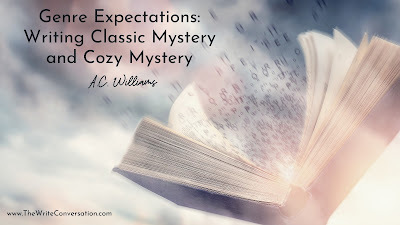
by A.C. Williams @ACW_Author
It’s no mystery what the top-selling fiction genre is: Romance. Even if you didn’t know that for sure, you probably could have guessed. But did you know that mystery is also one of the highest selling genres?
I’m not sure if these statistics are accurate, but if you can trust WorldMetrics.org, romance novels make up 23% of book sales in the United States. And the next most popular genre is mystery at 19%.
So if the mushy stuff isn’t your favorite, take heart. Instead, try writing something about murder.
Here’s the catch: There are as many types of mystery genres as there are romance genres. So today we’re going to chat about the expectations between the two most popular mystery options: Classics and Cozies.
But first, let’s do a quick review of the genre expectations we’ve discussed so far: Romantic Fantasy and Fantasy RomanceFantasy and Space OperaSteampunk and GaslampMagical Realism and Contemporary FantasyUrban Fantasy and Paranormal RomanceSuspense and ThrillersDystopian and Apocalyptic
That brings us to mysteries, everyone’s favorite. When I was young, I devoured every mystery I could find. Nancy Drew. Hardy Boys. Dana Girls. Trixie Belden (the best). When I got older I read Mary Higgins Clark and Agatha Christie. And, of course, I watched all the episodes of Columbo, Murder She Wrote, Inspector Morse, and Inspector Lewis (also the best).
But writing mysteries is more than just slapping together a haphazard chain of clues and developing an engaging detective to follow them. Our approach to writing a mystery needs to be determined by what audience is going to read them, and for the purposes of this article, we’re just going to talk about two variations: The Classic Mystery and the Cozy Mystery.
The “cozy” genre has skyrocketed in popularity across the board, even venturing into traditionally “not cozy” genres like science fiction and fantasy. But the cozy genre began with mysteries, so that’s where we’re going to park.
As a whole, the mystery genre is extremely formulaic, but formulas exist for a reason. They work. And no other fiction genre relies on its formula more completely than mystery, so it needs to be respected.
But unlike other genres that we have studied so far this year, the mystery genre has the same expectations no matter what its subgenre.
Every mystery, regardless of its subgenre, must include:a crime, a detective character, a villain, a trail of clues, misleading evidence, and a satisfying ending.
If you skip any of those elements, you may not have a mystery (or at least you may not have a mystery anyone will read). How the author portrays these elements establishes which subgenre best suits the story.
So what’s the difference between a cozy mystery and a classic mystery? Well, I’m far from an expert (definitely still learning about this genre myself), but what seems to be the dividing line between the classics and the cozies is the tone of the story.
Of course there are other differences, but primarily a classic mystery is written more along the lines of a suspense novel. There’s action. There’s tension. There’s drama and danger and peril. And in a cozy mystery, there is less of all of that. It’s not that there isn’t tension (every story ever told has tension). But the point of a cozy isn’t to keep a reader on the edge of their seats while they are reading; the goal for a cozy is to be charming.
A cozy may include all the same elements of a classic mystery, but most of them will take place off screen. There’s rarely a lot of violence shown in a cozy mystery. Children and animals are never harmed. The humor is always good natured. Usually the story is set in a small town or in a location where everyone knows each other. And usually, the sleuth in a cozy mystery has never solved a mystery before. They are a baker or a librarian or a housewife.
Compare those expectations to a classic mystery where a hardboiled, sometimes unlikeable detective has to face threats and perils unknown to solve a grisly murder (sometimes shown on the page).
It’s not that there isn’t violence in a cozy. I’ve read several that classify as cozy where there are fights and chases and even some danger, but the intent of the story isn’t to disrupt the reader or leave them uneasy.
Classics are thrilling and heart-pounding and dangerous; cozies are charming and wholesome and feature cuddly animals or homemade baked goods.
Which one do you like better?
TWEETABLEGenre Expectations: Writing Classic Mystery & Cozy Mystery from @ACW_Author on @EdieMelson (Click to Tweet)
Don't Miss the Previous Posts in This Series 1. WRITING ROMANTIC FANTASY AND FANTASY ROMANCE
2. WRITING FANTASY AND SPACE OPERA
3. WRITING STEAMPUNK AND GASLAMP
4. WRITING MAGICAL REALISM AND CONTEMPORARY FANTASY
5. WRITING URBAN FANTASY AND PARANORMAL ROMANCE
6. WRITING SUSPENSE AND THRILLERS
7. WRITING DYSTOPIAN AND APOCALYPTIC
8. WRITING CLASSIC MYSTERY AND COZY MYSTERY
 A.C. Williams, also known as Amy C. Williams, is a coffee-drinking, sushi-eating, story-telling nerd who loves cats, country living, and all things Japanese. Author of more than 20 books, she keeps her fiction readers laughing with wildly imaginative adventures about samurai superheroes, clumsy church secretaries, and goofy malfunctioning androids; her non-fiction readers just laugh at her and the hysterical life experiences she’s survived. If that’s your cup of tea (or coffee), join the fun at www.amycwilliams.com.
A.C. Williams, also known as Amy C. Williams, is a coffee-drinking, sushi-eating, story-telling nerd who loves cats, country living, and all things Japanese. Author of more than 20 books, she keeps her fiction readers laughing with wildly imaginative adventures about samurai superheroes, clumsy church secretaries, and goofy malfunctioning androids; her non-fiction readers just laugh at her and the hysterical life experiences she’s survived. If that’s your cup of tea (or coffee), join the fun at www.amycwilliams.com.
Published on September 05, 2024 22:00
September 4, 2024
Practical Tips to Help a Writer Move Forward with Confidence

by Lynn H. Blackburn @LynnHBlackburn
Ah, September, when summer is fading and school is in swing again.
Do you remember the delight of a new school year? Or did the new school year fill you with dread?
I loved learning. I was good at it and the prospect of learning new material made me happy. But I know it wasn’t like that for everyone. For some, school was a chore at best and a nightmare at worst. Some students couldn’t wait for the day to end so they could escape the constant pressure and sense of failure that they experienced on a regular basis.
I’ve recently realized that our early experiences with learning can have a profound impact on how we approach learning how to write as an adult.
Some of us dive deep into classes, blog posts, and books on the craft. We read everything we can find and learn from as many people as we can. We come out of these experiences confident that we can do this writing thing.
But some of us approach writing with a more timid aspect. We attend online classes or large conferences where we can hide. We don’t speak up and ask questions because we don’t want anyone to realize how much we don’t know. And we come out of these experiences unsure if we can do this writing thing or not.
If you find yourself in a less-than-confident position, I’d like to offer you a few practical tips and some encouragement as you move forward.
4 Tips—With Encouragement—to Help a Writer Move Forward
1. Learning to write is hard for everyone.
Hmm…you might be thinking, “Lynn, not sure if you understand the definition of encouragement if you’re leading with that.”
Oh, but I do! Here’s the thing. Those uber-confident writers who are busy learning every possible way to write? Guess what? It’s still going to be hard for them.
Are there rules, grammar, genre conventions, etc.? Sure there are. But no matter how many books you’ve read about perfecting your craft, when it comes time to write the story, you are going to have to figure out your own way.
So relax a little bit. Okay? Don’t let the people who think they know everything dim your joy. It’s going to be a struggle for everyone.
2. Learning to write takes time for everyone.
I made straight As in school, was the valedictorian of my high school class, and had a professor in college beg me to change my major to English after I wowed him with a paper on Shakespeare’s Henry IV.
Guess what? The first book I ever wrote broke every imaginable rule of writing. The story was pretty good, but it was completely unpublishable. I knew nothing about current publishing guidelines. I didn’t understand the rules of POV or the importance of picking a verb tense and sticking with it. I entered it into a contest and got this feedback: I wonder if this author even understands her own genre.
Yeah. That one stung.
The point is, your school experience means very, very little when it comes to writing for publication. It will take time to learn genre conventions and best practices. So don’t let your GPA or your class rank determine your path forward.
3. Learning to write will always be challenging for everyone.
No matter how much you learn, or how good you get, there will always be more you can do to improve your craft.
When I teach children to write, one of the rules we use is “easy + 1” - the idea is to stick with what the student can do easily, and then add one thing to it. Just one. Then, when they’ve mastered that, and it’s easy again, you add one more thing. And then another.
But you never add ten things at once because that’s overwhelming for anyone.
So maybe you start with a short story and you work on POV until you’ve nailed it. Then you write another but this time you focus on characterization. Then another but work on conflict. Then pacing. Then…then…then…
You get the idea?
4. Learning to write will always be easiest in a supportive community.
I’m not sure why any of us think we can or should do this writing life on our own. And if you have great story ideas, but don’t feel confident in your ability to get them on the page, you need to be sure you’re working with people who understand that and encourage you to find the best ways to succeed.
I have a child who is mildly dyslexic and moderately dysgraphic. He does not enjoy writing or reading, but he has fantastic ideas. He thinks deeply and carefully about various topics, and he can share them verbally with relative ease. But writing is a nightmare for him. So we make use of audiobooks, dictation, and grammar software to support him, and those things make a huge difference in his ability to communicate effectively.
If grammar and spelling aren’t your strong suit, there are a lot of great tools out there that you can use to improve your writing and that will allow you to focus on the great story ideas you have to share.
The bottom line is simple: God doesn’t only call the straight A, teacher’s pets to write. He calls people who have the stories He wants told. Please don’t keep those stories to yourself. We need them.
Fun fact: This whole blog post went in a direction I wasn’t expecting it to go. I can only assume that it was the one God wanted me to write. My prayer is that it will encourage you today.
Grace and peace,Lynn
TWEETABLEPractical Tips to Help a Writer Move Forward with Confidence @LynnHBlackburn on @EdieMelson (Click to Tweet)
 Lynn H. Blackburn is the award-winning author of Unknown Threat, Malicious Intent, and Under Fire, as well as the Dive Team Investigations series. She loves writing swoon-worthy southern suspense because her childhood fantasy was to become a spy, but her grown-up reality is that she's a huge chicken and would have been caught on her first mission. She prefers to live vicariously through her characters by putting them into terrifying situations while she's sitting at home in her pajamas! She lives in Simpsonville, South Carolina, with her true love, Brian, and their three children. Learn more at www.lynnhblackburn.com.
Lynn H. Blackburn is the award-winning author of Unknown Threat, Malicious Intent, and Under Fire, as well as the Dive Team Investigations series. She loves writing swoon-worthy southern suspense because her childhood fantasy was to become a spy, but her grown-up reality is that she's a huge chicken and would have been caught on her first mission. She prefers to live vicariously through her characters by putting them into terrifying situations while she's sitting at home in her pajamas! She lives in Simpsonville, South Carolina, with her true love, Brian, and their three children. Learn more at www.lynnhblackburn.com.
Published on September 04, 2024 22:00
September 3, 2024
The Power of Power Words To Connect Writers with Readers
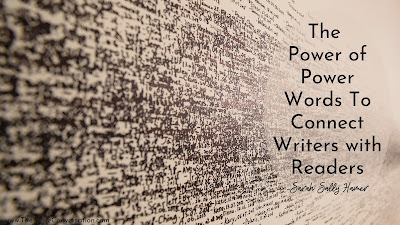
by Sarah Sally Hamer @SarahSallyHamer
Power words are, well, powerful! Evocative words tighten and enhance the theme of a story, enticing the reader to turn the page. But how do we choose our power words? And how can we insert them in the right places?
We have many really good examples of stories that are wrapped around a theme and use power words to boost the “flavor” of the story. Wuthering Heights and Jane Eyre, written by the Bronte sisters, for instance, are great cases in point of using weather and creepy houses and stormy relationships as a part of the setting. Try to imagine another classic, Gone With the Wind, set in any place except the Deep South. The heat by itself is almost another character, much less words like “survival” and “hunger” and “desire.”
We can use power words to describe other things than setting. Each character will need their own words to help readers distinguish between them (especially with secondary characters) and to deepen the understanding of their goals, motivations, and conflicts.
Can you describe Dorothy in The Wizard of Oz? Her power words go hand in hand with her character traits. She’s unhappy, naïve, and frightened when the story starts, but we watch the power words change as she travels her character arc path. She really is courageous to follow that yellow brick road, and to brave the Cowardly Lion when he jumps out of the bushes. She’s honest with herself and others about her real wants and needs, once she figures them out. And, she’s loyal, both to the allies she picks up on the way and to Toto, who is the pivotal character of the whole story. Every one of her attributes give us a chance to expand on her power words, giving her depth and making her real.
Here are a few tips to help you use power words:1. Determine your genre and theme, then create a list of power words that might apply.2. Do the same with at least the major characters using their character traits.3. Sprinkle the words throughout the story, using them only where they’ll make an impact. Make them work for their places!4. Try to place power words at the end of a sentence, paragraph, and/or a scene. Their effect grows exponentially when they’re not hidden in the middle of a sentence.
Just be careful not to overdo. As with any tool in your writer’s toolbox, we can overwhelm the reader with so many powerful words that they can have trouble catching their breath. Genre makes a huge difference in the choice of power word. Action/adventure stories, for example, may need stronger words, while romances may do better with softer, more sensual words.
So, find the words that work for you, for your genre, for your story, and for your characters. You’ll be amazed at how much of a difference they can make.
Here’s a prologue from my WIP, a fantasy romance. See how many power words you can find. I’ll put my interpretation into the comments and we can compare:
I woke as I usually did from the dream: my face and pillow soaked with my tears, my fingers bleeding from the bite of my teeth to force my silence, to keep Madame from sweeping into the harem to punish the noise maker, the one who has awoken the room with her cries of despair.
The dream is always the same. And, once again, I wondered. Was the dream just that—a dream of happiness and innocence never to be found again? Or was it a true memory of the place from which I’d been stolen? For I knew that I had not been born here as the other girls had.
I have memories of trees that are not carefully trimmed so as to not outgrow the small enclosure, of birds that flew high in the sky instead of being locked in a cage with bars similar to the ones that blocked our windows. I know I have seen the sun turn the sky pink and golden with its dawning and the moon rise round and orange like a ball from the place where the earth meets the sky. None of these things can be seen from the tiny garden where a fountain trickles an eternal stream of water or from the barred windows that face it.
The others think I dream of these things: the sun rising and the birds flying high and that is why I cry out in the night—that the bad genies pour these thoughts into my head like a pitcher pours water into a basin because it isn’t possible that these things exist. But I know better, at least in the darkness of the night when I, once again, find myself weeping into the pillow of my sleeping mat.
I don’t dream of places and things. I dream of my home and my family.
I dream of the night my life was shattered forever.
What power words do you use? Why?
TWEETABLEThe Power of Power Words To Connect Writers with Readers from @SarahSallyHamer on @EdieMelson (Click to Tweet)
 Sarah (Sally) Hamer, B.S., MLA, is a lover of books, a teacher of writers, and a believer in a good story. Most of all, she is eternally fascinated by people and how they 'tick'. She’s passionate about helping people tell their own stories and has won awards at both local and national levels, including two Golden Heart finals.
Sarah (Sally) Hamer, B.S., MLA, is a lover of books, a teacher of writers, and a believer in a good story. Most of all, she is eternally fascinated by people and how they 'tick'. She’s passionate about helping people tell their own stories and has won awards at both local and national levels, including two Golden Heart finals.A teacher of memoir, beginning and advanced creative fiction writing, and screenwriting at Louisiana State University in Shreveport for over twenty years, she also teaches online for Margie Lawson at www.margielawson.com. Sally is a free-lance editor and book coach, with many of her students and clients becoming successful, award-winning authors.
You can find her at info@mindpotential.org
Published on September 03, 2024 22:00
September 2, 2024
Learn to Elicit Emotion Through Point of View When You Write

by PeggySue Wells @PeggySueWells
Point of View may be the most efficient and effective tool a writer wields to elicit emotion in the reader.
Who is the narrator or storyteller of the project? Essentially, there are four categories of point of view. Within those four, a couple have subcategories.
Point of View Categories for WritersFirst PersonEpistolaryFlashbackCinematicPluralSecond personThird personLimitedObjective OmniscientFourth person
First Person POV is a story told from the character’s viewpoint. Characterized by the words I, Me, My, and Mine, the story unfolds as seen solely through the eyes of the central character.
Within the category of First Person, John Erickson is a master. Author of the multi-book Hank the Cowdog series, Erickson begins and ends each of his adventures with the same phrase. Head of Ranch Security, Hank the Cowdog opens each detective case with, “It’s me again, Hank the Cowdog.” Each book concludes with Hank the Cowdog declaring, “Case closed.”
Huckleberry Finn from The Adventures of Huckleberry Finn by Mark Twain is self-aware about his role as a teller of his own story, mentioning the existence of the book The Adventures of Tom Sawyer within the narrative.
An advantage to First Person POV is the reader can connect with the character when experiencing life through the character’s eyes, emotions, and thoughts. Readers consider:Would I feel the same in this situation?What does the character not know or understand?Are the conclusions of the character accurate?
In nonfiction writing, first-person POV provides curiosity, credibility, and integrity when the author is an expert in their field. Militant peacemaker and author Jamie Winship speaks from experience in his book, Living Fearless: Exchanging the Lies of the World for the Liberating Truth of God . “If you endeavor to love God with your soul, life becomes nearly unimaginable—the impossible moves into the sphere of possibility. If you endeavor to love God with your body, you will physically change. You will look different. You will move beyond being well into being fit.”
First-person POV can feel intimate and immediate as the reader experiences the story from inside the narrator's head. This angle can hook the reader into the character's plight such as when the main character is betrayed or finds true love. Simultaneously, the author is limited to reveal plot points only within the narrator’s knowledge without exploring the thoughts or motivations of other characters.
In the book, Christy , by Catherine Marshall, the reader shares Christy’s curiosity around who calls her back from joining Fairlight. “From a great distance, someone was calling my name. The voice was familiar. Whose? I did not want to hear it. The voice was a weight pulling me backward, drawing me away from the light. I would ignore it.”
Alongside Christy in this final scene of the beloved novel, the reader shares the exquisite surprise Christy feels to learn who truly loves her. “So his was the voice that called me back, Dr. MacNeill’s. He needed me. He loved me. He loved me like that.”
Within First Person POV are four subcategories.EpistolaryFlashbackCinematicPlural
POV is the tool a writer wields to collaborate with and tell the story in the most compelling manner.
TWEETABLELearn to Elicit Emotion Through Point of View When You Write from @PeggySueWells on @EdieMelson (Click to Tweet)
 PeggySue Wells is the bestselling author of 40 books and collaborator of many more. Action and adventure, romantic suspense, military romance, and cozy mystery are the page-turning novels by P.S. Wells, including Homeless for the Holidays, Chasing Sunrise, The Patent, and Unnatural Cause. How to live better, easier, and simpler is the focus of her nonfiction including The Ten Best Decisions A Single Mom Can Make. Founder of SingleMomCircle.com, PeggySue coaches writing and speaks at events and conferences. When not writing, she parasails, skydives, snorkels, scuba dives, rides horses, and has taken (but not passed) pilot training. Connect with her at www.PeggySueWells.com, on Facebook at PeggySue Wells, and LinkedIn at linkedin.com/in/peggysuewells
PeggySue Wells is the bestselling author of 40 books and collaborator of many more. Action and adventure, romantic suspense, military romance, and cozy mystery are the page-turning novels by P.S. Wells, including Homeless for the Holidays, Chasing Sunrise, The Patent, and Unnatural Cause. How to live better, easier, and simpler is the focus of her nonfiction including The Ten Best Decisions A Single Mom Can Make. Founder of SingleMomCircle.com, PeggySue coaches writing and speaks at events and conferences. When not writing, she parasails, skydives, snorkels, scuba dives, rides horses, and has taken (but not passed) pilot training. Connect with her at www.PeggySueWells.com, on Facebook at PeggySue Wells, and LinkedIn at linkedin.com/in/peggysuewells
Published on September 02, 2024 22:00
September 1, 2024
Make Sure Your Self-Editing Efforts are Productive by Staying Up-to-Date with Publishing Trends & Tips
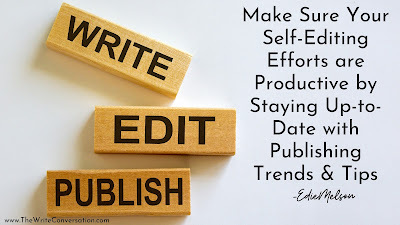
by Edie Melson @EdieMelson
Tips & Trends in Print & Ebooks
1. Self-publishing is hotter than ever. Many independent bookstores are very open to self-published books as long as they’re with standard distributors and offer store returns. Be warned though, offering returns can cost authors money, so do your homework.
2. Many small publishers are being acquired by larger ones. This tells us that there are good small presses out there. Do your homework and set goals BEFORE being caught up in the “They offered me a contract” insanity.
3. Book covers matter. Just because a book cover is beautiful doesn’t mean it’s effective. Learn what makes a cover work—Fonts, text placement, colors, even cover endorsements.
4. Be aware of the changes in the way people read. The general reader prefers Stories that move forward. This means be careful about the use of narrative that bogs down the story. Avoid an overuse of colons, semi-colons and especially exclamation marks.A light hand with dialect. Anything that makes a book hard to read is going to be tough to keep the interest with readers.Shorter chapters. Time is short and frequently a reader will commit if a chapter is short and often read additional chapters. However if the chapters are long, they’ll put in a bookmark and wait for more time—something that rarely happens.
5. Don’t expect to be the exception. They’re called exceptions because they don’t happen often. When we base publishing success on this slight change we are setting ourselves up for failure or at least a very uphill climb.
6. Social media really does sell books when used effectively. I have a friend who used her email list and Facebook to generate over 1000 preorders on a recent book. Don’t bombard your social media audience with advertising only. First build your audience by providing value that benefits them (not you). Then when you’re ready to start promoting, they’re ready to listen and help spread the word.
7. In person marketing is hot and effective. While social media does sell books, people are also attaching more value to in-person events. Make sure you do more than just hold a book signing, instead make it an event!
8. Excellence is critical. This means self-pub authors must invest in professional editing, And even authors with traditional contracts with small to medium publishers are investing in freelance editing. NOTE: hire an editor with a proven track record. Remember that academic writing is VERY different from commercial publishing. The style guides are different and so are the rules.
Self-editing Tips
1. When preparing your book for submission or getting it ready to self-publish these are things you should NOT do for formatting.Use two spaces between sentences. This is a convention that was in place during the era when typewriters were popular. Prior to that, the standard was a single space between sentences and that’s the standard now. Use the indent key or space bar to indent paragraphs. Instead set Microsoft Word for automatic indents.Use the return key to get to another page. Instead insert a page break.Use block formatting. Instead double-space the entire document, with no extra lines between paragraphs.Use non-standard margins. Standard is 1-inch margins all around the page.
2. Beware of too much direct address in dialogue. People do not go around calling each other by name when they start a sentence. Don’t make the mistake of doing that when writing.Not: “Bob, did you see that?”Instead: Sally focused on Bob. “Did you see that?”
3. Avoid state-of-being-verbs used in passive tense. Not: The scent was fresh and new like a flower after the rain.Instead: The fresh scent hung in the air like a late blooming rose after the rain.
4. Invite your reader to experience the story along with your characters, don’t make them bystanders by telling the story. In my opinion, this is a better way to look at “Show don’t tell”. That phrase is overused and vague. This includes a lot of tricks including:Don’t use extraneous tags to tell the story. Stick with said, asked and an occasional whispered.Not: “I hate him,” she stated vehemently. Instead: “I hate him.” A muscle in her jaw twitched.Avoid Naming emotions. I won’t say I never do it, but I do my best to avoid it.Not: Susan felt restless.Instead: Susan paced across the floor, wearing a pattern in the dust.Look for words that give you a clue you’re telling instead of showing: Felt, remembered, knew, watched, began, started, saw, looked, seemed. Be wary of using omniscient POV. It’s very difficult to write it well enough that the reader feels a connection to the characters.
5. Watch for repeated or weasel words. Especially check for the overuse of just, then, and that.
6. Avoid the overuse of qualifying words, even in dialogue, (“Well, it was meant to be a surprise.”)
7. Talking heads—and the opposite—unnecessarily speaker beats. Here’s a news flash. Every action a character makes should move the story ahead or deepen the scene.
8. Dialogue written in monologues. Even if a character is lecturing or making a speech, insert reactions from other characters.
9. Avoid words that are vague—moved, things, it.
10. Look out for redundancy: Sally shook her head. “No.”
11. Motivation-reaction units. Did he jump after he heard the gunshot or before?
12. Include all 5 senses in every scene.
13. Examine sentence structure. Do I start three paragraphs in a row with she? Are all my sentences in a certain section written the same way?
14. Read your entire book out loud.
Specific for General Nonfiction (not memoir or biography)
1. In general, larger publishers expect nonfiction authors to have an established, active platform.
2. Insert bold headings into chapters for easier readability.
3. Stay on track. Nonfiction readers are looking for answers. ALWAYS keep that in mind.
4. Utilize bullet points and lists for easier take-away.
TWEETABLEMake Sure Your Self-Editing Efforts are Productive by Staying Up-to-Date with Publishing Trends & Tips - @EdieMelson (Click to Tweet)
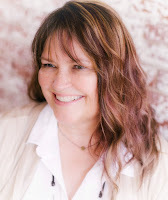 Edie Melson is a woman of faith with ink-stained fingers observing life through the lens of her camera. No matter whether she’s talking to writers, entrepreneurs, or readers, her first advice is always “Find your voice, live your story.” As an author, blogger, and speaker she’s encouraged and challenged audiences across the country and around the world. Her numerous books reflect her passion to help others develop the strength of their God-given gifts and apply them to their lives.Connect with her on her website, through Facebook, X (formally Twitter) and on Instagram.
Edie Melson is a woman of faith with ink-stained fingers observing life through the lens of her camera. No matter whether she’s talking to writers, entrepreneurs, or readers, her first advice is always “Find your voice, live your story.” As an author, blogger, and speaker she’s encouraged and challenged audiences across the country and around the world. Her numerous books reflect her passion to help others develop the strength of their God-given gifts and apply them to their lives.Connect with her on her website, through Facebook, X (formally Twitter) and on Instagram.
Published on September 01, 2024 22:00
August 31, 2024
Our Writing Life Improves as We Focus on Community with God
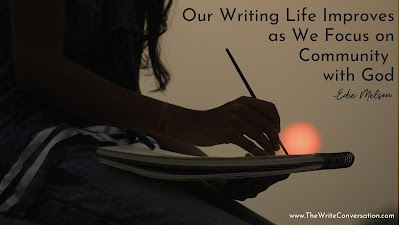
by Edie Melson @EdieMelson
All creatives need community. We need safe places to share our hopes and our dreams and we need people who spur us on and inspire us. It’s hard to create in a vacuum.
Even more importantly, we need community and communion with God. He is the ultimate creator. He gave each of us a specific gift—we have creativity in common—but the way it manifests itself is unique for every person. Our creative gift is no better or worse than anyone else’s.
But as I’ve said so many times, it’s impossible to get water from a dry well. And for writers—and other creatives—this is truth. We must constantly return to the source of living water to replenish our own reserves.
As we begin a new month, let's take some time to be deliberate and disciplined about connecting with God. Below I have 5 tips. Following that, are practical things we can do for each of the five to make that connection.
5 Tips to Help Writers Connect with God
1. Prayer: Prayer is a conversation with God. It involves speaking and being silent so we can listen. Prayer is NOT reciting a list of wants or even hopes and dreams.
2. Study: God has already given us so much of Himself through His Holy Word. I for one don’t take advantage of that gift. Instead it sits in a closet in my mind while I whine for a new gift.
3. Fellowship: Just like our Bible verses says, “Do not forsake the gathering together…” For me, when life gets difficult, I disappear. Just like a turtle, I pull my head inside my shell and snap at anyone who dares to come close.
4. Exercise: Yes, moving physically is an important component to refilling the well. For those who struggle with health issues, it may mean sitting on a chair outside for a few minutes, or walking around the room. For those of us blessed with good health, it means a brisk walk or even a game of tennis.
But there’s another thing we need to exercise—the gift God has given us. Do I believe the old adage use it or lose it? Well, not exactly. The Bible tells us very clearly in Romans 11:29 that the gifts and calling of God are irrevocable. But our gifts become rusty and stiff without use. Just like the gift of God’s word, my calling can be relegated to a dusty corner of my life and forgotten.
5. Submission: Yep, you heard that write. I believe that as writers we must submit our workFirst to GodThen to other writers for critique and gentle feedbackFinally to the world
PRACTICAL, Creative Connections for Each Point
1. Prayer: Assemble a prayer book. Take some paper: any kind that you can write on (many kinds are even better).Tear that paper into fairly similar size pieces: no smaller than 3” x 3”. If you’re not feeling creative, get some index cards and use them instead. You need 30 pieces. For the next 30 days, write one single prayer about your writing on each slip of paper. It can be a secret want, an open door, blessing on your current work, even something to do with social media or attending a conference. Doesn’t matter, just write one single request a day.Decorate the pages as you’d like on the side where you wrote your prayer request. Leave the other side mostly blank because we’re going to use it in the next exercise. Bind them together using a binder clip, needle and thread or punch holes and use a binder ring. Put this prayer book somewhere near where you write so you can see it daily. Sit back and watch God work. Every time God answers a prayer, make a note of it somehow on that page and record the date.
2. Study: Add to your prayer book.For this, every day you write a prayer, ask God to lead you to a relevant Bible verse. You can write out that verse on the back of that prayer page or just add the scripture reference.
3. Fellowship:Gather together in a group (online or in person) and commit to pray for one another. You can gather in groups of 2 or more. Encourage each other for the next 30 days.
4. Exercise:Commit to regular physical activity and regular exercise of your gift of writing (or if you’re here and you’re not a writer, the creative gift God has given you).
5. Submission:Tell those that you’re praying with how you’re exercising your gift. Be accountable and submit yourselves to one another. Spur each other on.
TWEETABLEOur Writing Life Improves as We Focus on Community with God - @EdieMelson (Click to Tweet)
 Edie Melson is a woman of faith with ink-stained fingers observing life through the lens of her camera. No matter whether she’s talking to writers, entrepreneurs, or readers, her first advice is always “Find your voice, live your story.” As an author, blogger, and speaker she’s encouraged and challenged audiences across the country and around the world. Her numerous books reflect her passion to help others develop the strength of their God-given gifts and apply them to their lives.Connect with her on her website, through Facebook, X (formally Twitter) and on Instagram.
Edie Melson is a woman of faith with ink-stained fingers observing life through the lens of her camera. No matter whether she’s talking to writers, entrepreneurs, or readers, her first advice is always “Find your voice, live your story.” As an author, blogger, and speaker she’s encouraged and challenged audiences across the country and around the world. Her numerous books reflect her passion to help others develop the strength of their God-given gifts and apply them to their lives.Connect with her on her website, through Facebook, X (formally Twitter) and on Instagram.
Published on August 31, 2024 22:00



